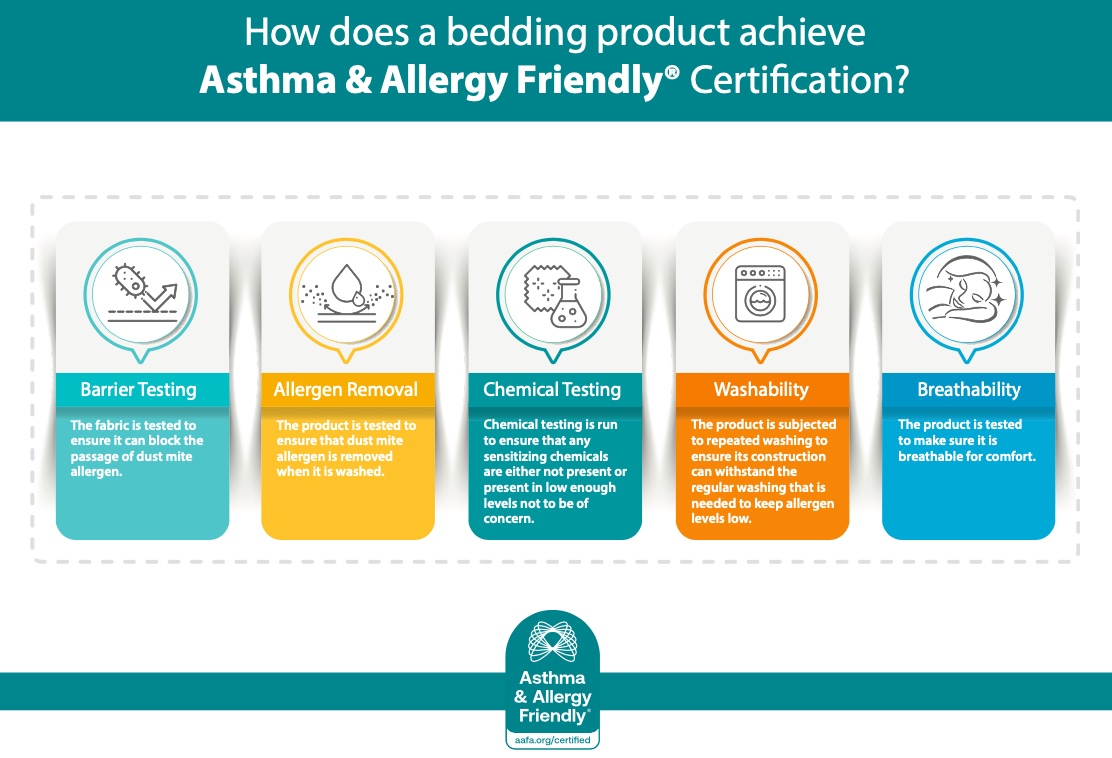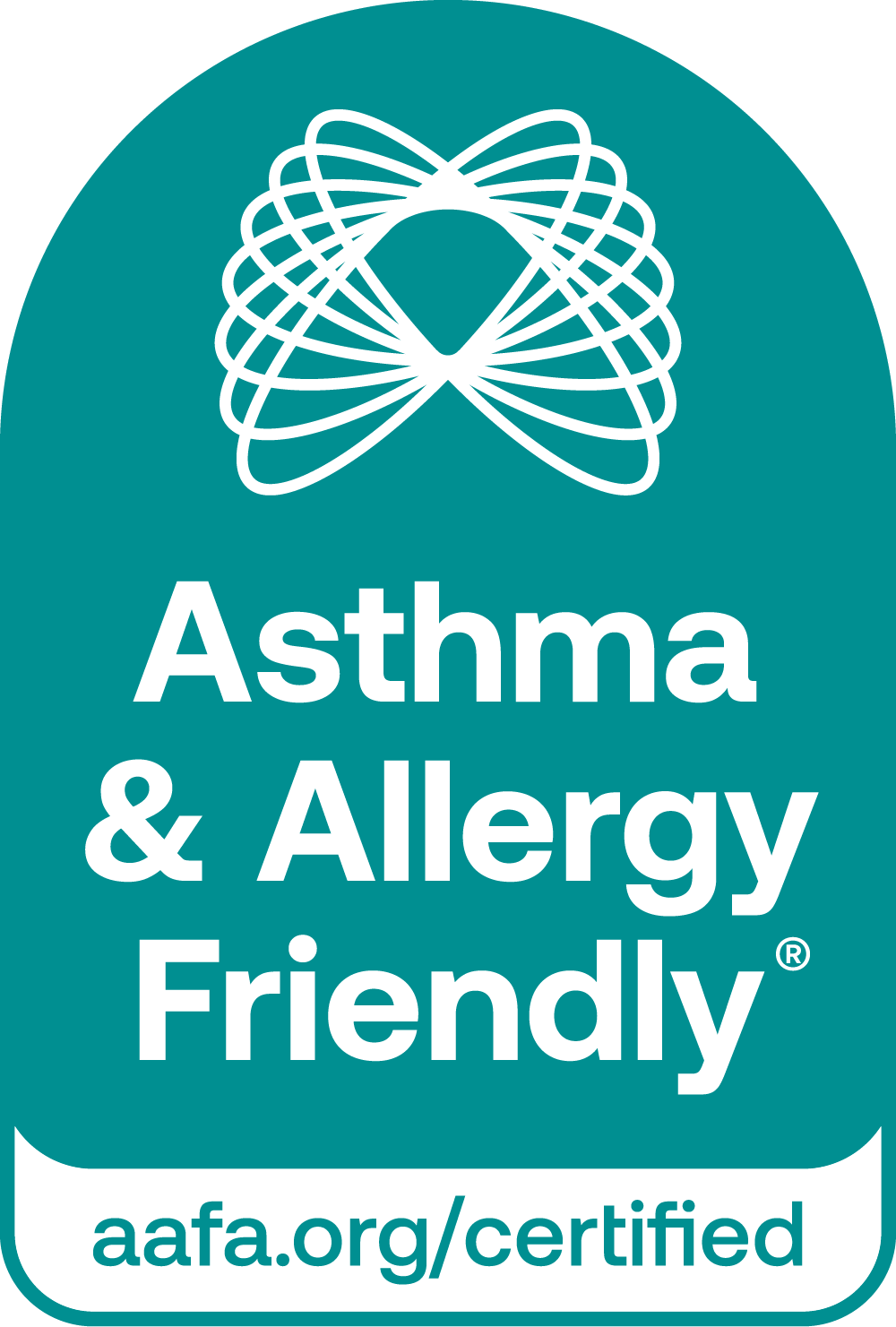Certified bedding plays a vital role in reducing allergens and improving indoor air quality, especially for those affected by asthma and allergies
May is Asthma and Allergy Awareness Month, a time dedicated to raising public awareness about the impact of asthma and allergies on people and their families. Since 1984, the Asthma and Allergy Foundation of America (AAFA) has used this month to promote the importance of diagnosis, treatment, and management of these conditions.
For the 100 million Americans impacted by asthma and allergies, May represents a peak season for symptoms, making it an ideal time to educate those around you about the importance of creating healthier indoor environments. Indoor air quality (IAQ) plays a critical role in overall health, particularly for individuals with asthma or allergies.
This article will explore how bedding impacts IAQ, highlight the importance of scientifically tested and certified products, and introduce our Certified bedding partners working to improve indoor air quality, including SIJO,National Allergy, Wicked Sheets, Downlite, and Allied Home.
How Bedding Affects Indoor Air Quality
Bedding is a major contributor to the air quality in your bedroom. Dust mites, which thrive in the warm, humid environment of bedding, are a significant concern. These tiny creatures, invisible to the naked eye, feed on dead skin cells, making pillows, mattresses, and duvets ideal breeding grounds. The problem lies not just in the mites themselves but in their body parts and waste, which can trigger asthma and allergic reactions. There is a strong association between sensitization to allergens derived from dust mites and conditions including asthma, perennial rhinitis, and atopic dermatitis.
Additionally, chemicals used in the production of bedding can negatively impact IAQ. Many textiles undergo treatments for wrinkle resistance, flame retardancy, and colorfastness, introducing potential irritants into your indoor environment. Formaldehyde, a common chemical used in bedding, is known to irritate the respiratory system and skin, potentially exacerbating asthma symptoms. Azo dyes, which create vibrant colors, can also break down into harmful substances over time.
Given these risks, it’s essential to choose bedding products that reduce exposure to dust mites and chemicals. We spend about one-third of our lives in our bedrooms, and many individuals, including children, the elderly and people with illness may spend a good deal more than this.
Effective Bedding and Strategies for Better Indoor Air Quality
One of the most effective ways to improve indoor air quality in your bedroom is by using scientifically validated dust mite-proof encasings for pillows, duvets, and mattresses. These encasings are designed to block dust mites and their allergens from passing through, reducing exposure to these triggers. For maximum effectiveness, it’s important to choose encasings made from tightly woven fabrics with appropriate thread count and pore size to prevent allergens from escaping, while still allowing breathability for comfort during sleep.
Another strategy is to regularly wash your bedding in hot water (130°F/55°C) to help control dust mite allergens, as well as pet dander and other potential triggers. In addition, selecting high-quality, breathable bedding products that can withstand frequent hot washing and do not contain known irritants is crucial for cultivating a healthier sleep environment.
Remember, laundry detergents also play a role in indoor air quality, so choose a certified or verified detergent. The Asthma & Allergy Friendly® Certification Program subjects laundry detergents to biological, physical, and chemical testing to ensure they are effective in reducing allergens without contributing to poor IAQ.
The Importance of Third-Party Certification
Choosing bedding that is independently tested and verified by third-party organizations is essential to ensure it meets the highest standards for allergy management and indoor air quality. Our Asthma & Allergy Friendly® Certification Program is one such certification that provides consumers with the assurance that bedding products have undergone rigorous testing to meet strict scientific criteria.
Developed by Allergy Standards Limited in collaboration with the Asthma and Allergy Foundation of America (AAFA), the Asthma & Allergy Friendly® Certification Program helps consumers identify bedding products that are suitable for people with asthma and allergies. Unlike unregulated terms such as “hypoallergenic,” which can be used without standardized testing, the Asthma & Allergy Friendly® Certification is based on comprehensive, accredited laboratory testing.
How the Certification Program Tests and Certifies Bedding
The certification process for bedding under the Asthma & Allergy Friendly® Certification Program involves several key tests to ensure the product is effective in reducing allergen exposure and that it contains no harmful chemicals that could potentially cause allergic reactions. These tests include:
- Barrier Testing: Ensures the cover fabric prevents dust mites and allergens from passing through, including testing of seams and zippers for potential weak points.
- Allergen Removal: Bedding is seeded with allergens in a controlled environment and then washed to confirm that washing effectively reduces allergen content.
- Repeated Washing: Bedding is subjected to multiple washing cycles to ensure it retains its physical integrity and allergen-reducing properties.
- Chemical Testing: Fabric and fill materials are tested for residual chemicals such as azo dyes, pesticides, volatile organic compounds (VOCs), and irritant chemicals.
- Breathability: The bedding is tested for breathability, ensuring comfort while acting as an allergen barrier.

Leading Bedding Partners for Better Indoor Air Quality
Several bedding manufacturers are committed to improving indoor air quality through scientifically tested and Certified products. Our Certified partners have voluntarily submitted their products for independent testing so that they can offer validated products that can be trusted by the consumer, empowering consumers to make informed decisions for healthier indoor environments
- SIJO: Known for their commitment to sustainable, luxurious, and allergy-friendly bedding, SIJO’s bestselling Certified AiryWeight range is their top seller.
- National Allergy: A trusted name in allergy relief, National Allergy provides bedding products designed to reduce allergen exposure, helping to improve IAQ in the bedroom.
- Wicked Sheets: Specializing in moisture-wicking bedding, Wicked Sheets offers products designed to promote better sleep quality while reducing allergens.
- Downlite: Known for their high-quality bedding products, Downlite’s items are made to help minimize allergens in the home.
- Allied Home: Still a family-run operation, Allied Home uses the highest quality, innovative and responsibly sourced materials. Allied Home has been a Certified partner since 2017
Certification has provided our bedding partners with valuable opportunities to participate in impactful community initiatives. For example, in October, SIJO, National Allergy, Wicked Sheets, and Downlite collaborated on a special episode of George to the Rescue, which focused on a home renovation for the Fruhschein family, whose children face significant health challenges. This heartwarming episode emphasized the importance of a “whole-home approach” to improving indoor air quality for families managing asthma and allergies. By applying this comprehensive strategy, every room was thoughtfully designed to minimize asthma and allergy triggers, from the bedrooms to common areas, ensuring a healthier living environment for the family.
Conclusion
Bedding plays a fundamental role in indoor air quality, particularly for individuals with asthma or allergies. Dust mites and chemicals in bedding can negatively affect your health, making it crucial to select products that have been independently tested and certified. By choosing Certified bedding from trusted brands like SIJO, National Allergy, Wicked Sheets, Allied Home and Downlite, you are taking proactive steps toward a healthier, more comfortable home environment, especially as we observe Asthma and Allergy Awareness Month.
